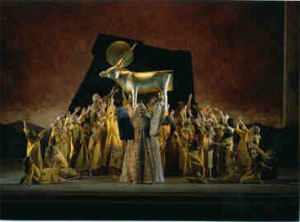Idolatry: From A Golden Calf To "Military Metaphysics"
For Sunday October 9, 2005
Lectionary Readings (Revised Common Lectionary, Year A)
Exodus 32:1–14 or Isaiah 25:1–9
Psalm 106:1–6, 19–23 or Psalm 23
Philippians 4:1–9
Matthew 22:1–14
 |
Dance Around the Golden Calf, Emil Nolde, 1910. |
Before Moses ever descended Mount Sinai with the two tablets etched with the Ten Commandments, the second of which reads "you shall not make for yourself an idol" (Exodus 20:4), the Hebrews grew impatient and hectored his proxy Aaron, "Come, make us gods who will go before us" (Exodus 32:1). In this ancient story, so evocative with contemporary applications, the people bowed down to a golden calf, sacrificed to it, and even proclaimed national festivities to celebrate it.
Idols lure us toward powerful illusions, misplaced hopes, unfounded hubris, seductive promises, in short, to false gods that come in all sizes and shapes. These gods promise much but deliver little. We can idolize almost anything—career, race, gender, sex, wealth, age, or nation. Some of our gods are so petty and pathetic that they would be laughable if they were not so insidious and corrosive, as when we imagine that the zip code of our address confers upon us status, that wearing clothes with logos validates our identity, or that wealth bestows security. The robust health of the advertising industry testifies to the power of these puny "household gods."
Other idolatries are more global than personal, more public than private, more institutional than individual, and wreak far more violence upon humanity than our household gods. The most pernicious of these is what C. Wright Mills described as a "military metaphysic," a way of construing every national aspiration or international problem in distinctly military terms.1 The idol of war, Chris Hedges observes in his book Losing Moses on the Freeway (2005), "is, perhaps, the most common and destructive form of idolatry, one that has left most religious institutions morally bankrupt." He ought to know, having spent twenty years as a journalist covering wars in fifty countries. What else ought a person conclude after observing a Catholic priest in Guatemala bless weapons and soldiers, Pat Robertson call for the assassination of a head of state, religious liberals romanticize the Marxist Sandinista government, or Serbian Orthodox priests countenance ethnic cleansing?2 Orthodox, evangelicals, Catholics, and liberal Christians have all invoked God to justify modern warfare's "slaughterhouse and orgy of destruction" (Bacevich) as a means to secure and even expand nationalistic ideals and self-interests.
In his book The New American Militarism (2005), Andrew Bacevich desacralizes our idolatrous infatuation with military might, but in a way that avoids the partisan cant of both the left and the right that belies so much discourse today. Bacevich's personal experiences and professional expertise lend his book an air of authenticity that I found compelling. A veteran of Vietnam and subsequently a career officer, a graduate of West Point and later Princeton where he earned a PhD in history, director of Boston University's Center for International Relations, he describes himself as a cultural conservative who views mainstream liberalism with skepticism, but who also is a person whose "disenchantment with what passes for mainstream conservatism, embodied in the present Bush administration and its groupies, is just about absolute." Finally, he identifies himself as a "conservative Catholic." Idolizing militarism, Bacevich insists, is far more complex, broader and deeper than scape-goating either political party, accusing people of malicious intent or dishonorable motives, demonizing ideological fanatics as conspirators, or replacing a given administration. Not merely the state or the government, but society at large, is enthralled with all things military.
Our military idolatry, Bacevich believes, is now so comprehensive and beguiling that it "pervades our national consciousness and perverts our national policies." We have normalized war, romanticized military life that formally was deemed degrading and inhuman, measured our national greatness in terms of military superiority, and harbor naive, unlimited expectations about how waging war, long considered a tragic last resort that signaled failure, can further our national self-interests. Utilizing a "military metaphysic" to justify our misguided ambitions to recreate the world in our own image, with ideals that we imagine are universal, has taken about thirty years to emerge in its present form. It is this marriage between utopians ends and military means that Bacevich wants to annul.
 |
Dance Around the Golden Calf from The Nuremberg Chronicle (1493). |
How have we come to idolize military might with such uncritical devotion? He likens it to pollution: "the perhaps unintended, but foreseeable by-product of prior choices and decisions made without taking fully into account the full range of costs likely to be incurred".3 In successive chapters he analyzes six elements of this toxic condition that combined in an incremental and cumulative fashion.
After the humiliation of Vietnam, an "unmitigated disaster" in his view, the military set about to rehabilitate and reinvent itself, both in image and substance. With the All Volunteer Force, we moved from a military comprised of citizen-soldiers that were broadly representative of all society to a professional warrior caste that by design isolated itself from broader society and that by default employed a disproportionate percentage of enlistees from the lowest socio-economic class. War-making was thus done for us, by a few of us, not by all of us. Second, the rise of the neo-conservative movement embraced American Exceptionalism as our national end and superior coercive force as the means to franchise it around the globe. Myth-making about warfare sentimentalized, sanitized and fictionalized war. The film Top Gun is only one example of "a glittering new image of warfare." Fourth, without the wholehearted complicity of conservative evangelicalism, militarism would have been "inconceivable," a tragic irony when you consider that the most "Christian" nation on earth did far less to question this trend than many ostensibly "secular" nations. Fifth, during the years of nuclear proliferation and the fears of mutually assured destruction, a "priesthood" of elite defense analysts pushed for what became known as the Revolution in Military Affairs (RMA). RMA pushed the idea of "limited" and more humane war using game theory models and technological advances with euphemisms like "clean" and "smart" bombs. But here too our "exuberance created expectations that became increasingly uncoupled from reality," as the current Iraq debacle demonstrates. Finally, despite knowing full well that dependence upon Arab oil made us vulnerable to the geo-political maelstroms of that region, we have continued to treat the Persian Gulf as a cheap gas station. How to insure our Arab oil supply, protect Saudi Arabia, and serve as Israel's most important protector has always constituted a squaring of the circle. Sordid and expedient self interest, our "pursuit of happiness ever more expansively defined," was only later joined by more lofty rhetoric about exporting universal ideals like democracy and free markets, or, rather, the latter have only been a (misguided) means to secure the former.
 |
MOSES CONFRONTS GOLDEN CALF—Old Testament "Living Picture" in newly designed Oberammergau Passion Play. Photo: Brigitte Maria Mayer/©Oberammergau 2000. |
In 1795, James Madison warned that "of all the enemies of public liberty, war is perhaps the most to be dreaded, because it comprises and develops the germ of every other".4 Beyond such civic welfare, the text from Isaiah for this week reminds believers that to understand God in terms of narrow nationalism secured by military violence is to create an idol in our own image. Rather, Isaiah writes, He is a God who longs to prepare a rich banquet for "all people," to remove everything that separates "all nations," wipe away the tears of "all faces," and, contrary to our idolatry of militarism, to "swallow up death forever."
For further reflection:
* For further reading, see Chris Hedges, War is a Force That Gives Us Meaning.
* Try try to find people who are both Christian believers and veterans of active duty with whom to discuss military idolatry.
* Can you think of examples of our culture's idolatry of a "military metaphysic?"
* Bacevich quotes H.L. Mencken, "There is always a well-known solution to every human problem—neat, plausible, and wrong." How do we move beyond simplistic sloganeering of the left and right to address military idolatry? Note: in the last part of his book Bacevich offers ten suggestions.
[1] Cited by Andrew Bacevich, The New American Militarism; How Americans Are Seduced By War (Oxford: Oxford University Press, 2005), p. 2.
[2] Chris Hedges, Losing Moses on the Freeway (New York: Free Press, 2005), p. 50.
[3] Bacevich, p. 206.
[4] Bacevich, p. 7.





